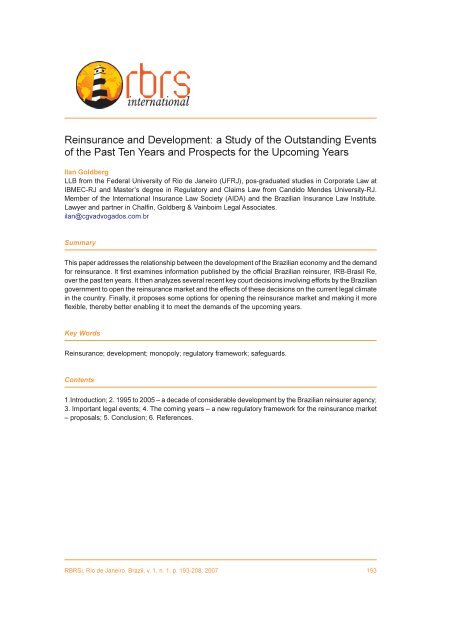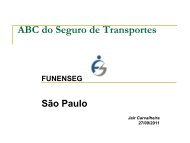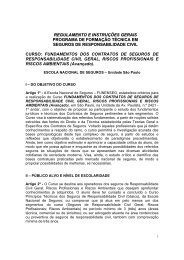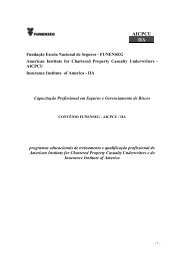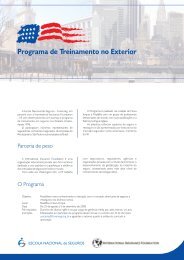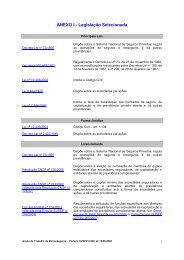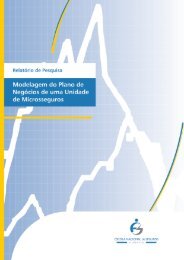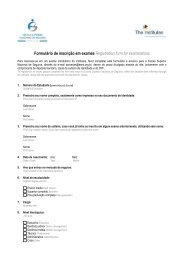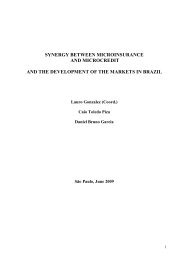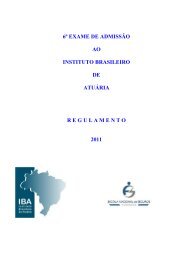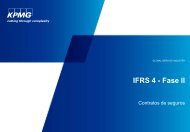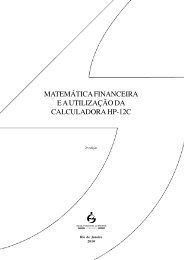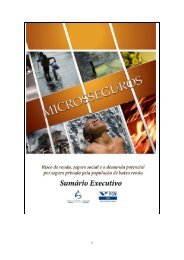RBRSi 1- 9 Ilan Goldberg.PMD - Escola Nacional de Seguros
RBRSi 1- 9 Ilan Goldberg.PMD - Escola Nacional de Seguros
RBRSi 1- 9 Ilan Goldberg.PMD - Escola Nacional de Seguros
Create successful ePaper yourself
Turn your PDF publications into a flip-book with our unique Google optimized e-Paper software.
Reinsurance and Development: a Study of the Outstanding Events<br />
of the Past Ten Years and Prospects for the Upcoming Years<br />
<strong>Ilan</strong> <strong>Goldberg</strong><br />
LLB from the Fe<strong>de</strong>ral University of Rio <strong>de</strong> Janeiro (UFRJ), pos-graduated studies in Corporate Law at<br />
IBMEC-RJ and Master’s <strong>de</strong>gree in Regulatory and Claims Law from Candido Men<strong>de</strong>s University-RJ.<br />
Member of the International Insurance Law Society (AIDA) and the Brazilian Insurance Law Institute.<br />
Lawyer and partner in Chalfin, <strong>Goldberg</strong> & Vainboim Legal Associates.<br />
ilan@cgvadvogados.com.br<br />
Summary<br />
This paper addresses the relationship between the <strong>de</strong>velopment of the Brazilian economy and the <strong>de</strong>mand<br />
for reinsurance. It first examines information published by the official Brazilian reinsurer, IRB-Brasil Re,<br />
over the past ten years. It then analyzes several recent key court <strong>de</strong>cisions involving efforts by the Brazilian<br />
government to open the reinsurance market and the effects of these <strong>de</strong>cisions on the current legal climate<br />
in the country. Finally, it proposes some options for opening the reinsurance market and making it more<br />
flexible, thereby better enabling it to meet the <strong>de</strong>mands of the upcoming years.<br />
Key Words<br />
Reinsurance; <strong>de</strong>velopment; monopoly; regulatory framework; safeguards.<br />
Contents<br />
1.Introduction; 2. 1995 to 2005 – a <strong>de</strong>ca<strong>de</strong> of consi<strong>de</strong>rable <strong>de</strong>velopment by the Brazilian reinsurer agency;<br />
3. Important legal events; 4. The coming years – a new regulatory framework for the reinsurance market<br />
– proposals; 5. Conclusion; 6. References.<br />
<strong>RBRSi</strong>, Rio <strong>de</strong> Janeiro, Brazil, v. 1, n. 1, p. 193-208, 2007 193
Sinopsis<br />
Reaseguro y <strong>de</strong>sarrollo: un estudio acerca <strong>de</strong> los principales factores ocurridos en los últimos<br />
diez años y las perspectivas para los próximos años<br />
<strong>Ilan</strong> <strong>Goldberg</strong><br />
Graduado en Ciencias Jurídicas por la Universidad Fe<strong>de</strong>ral <strong>de</strong> Río <strong>de</strong> Janeiro (UFRJ). Posgraduado en<br />
Derecho Empresarial por el IBMEC-RJ. Cursando Master en Derecho <strong>de</strong> la Regulación y Competencia<br />
por la Universidad Candido Men<strong>de</strong>s. Miembro <strong>de</strong> la Asociación Internacional <strong>de</strong> Derecho <strong>de</strong> Seguro –<br />
AIDA, Socio efectivo do IBDS – Instituto Brasileño <strong>de</strong> Derecho <strong>de</strong>l Seguro. Abogado, Socio <strong>de</strong> Chalfin,<br />
<strong>Goldberg</strong> & Vainboim Advogados Associados<br />
ilan@cgvadvogados.com.br<br />
Resumen<br />
Este estudio presenta la asociación entre el <strong>de</strong>sarrollo <strong>de</strong> la economía brasileña y la <strong>de</strong>manda por<br />
reaseguro. Son examinados los resultados publicados por el reasegurador oficial brasileño, IRB-Brasil<br />
Re, durante los últimos diez años. A continuación, son analizadas algunas recientes e importantes<br />
<strong>de</strong>cisiones judiciales involucrando esfuerzos por parte <strong>de</strong>l Gobierno Brasileño para cuidar <strong>de</strong> la apertura<br />
<strong>de</strong>l mercado <strong>de</strong> reaseguros y sus respectivos efectos. Finalmente, son presentadas algunas propuestas<br />
para la apertura <strong>de</strong>l mercado <strong>de</strong> reaseguros, haciéndolo más flexible para ir al encuentro <strong>de</strong> las necesida<strong>de</strong>s<br />
que vendrán en los próximos años.<br />
Palabras-Clave<br />
Reaseguro; <strong>de</strong>sarrollo; monopolio; marco reglamentario; salvaguardas.<br />
Sumario<br />
1. Introducción; 2. 1995 a 2005 – una década <strong>de</strong> consi<strong>de</strong>rable <strong>de</strong>sarrollo por parte <strong>de</strong>l órgano reasegurador<br />
Brasileño; 3. Hechos jurídicos relevantes; 4. Los años veni<strong>de</strong>ros – un nuevo marco reglamentario para el<br />
mercado <strong>de</strong> reaseguros – propuestas; 5. Conclusión; 6. Referencias bibliográficas.<br />
<strong>RBRSi</strong>, Rio <strong>de</strong> Janeiro, Brazil, v. 1, n. 1, p. 193-208, 2007 194
1. Introduction The study of the role of reinsurers in Brazil over the last <strong>de</strong>ca<strong>de</strong>, along<br />
with the prospects for the future, is surely inextricably intertwined with<br />
the country’s <strong>de</strong>velopment.<br />
Whatever the rationale of the infrastructure <strong>de</strong>voted to heating up the<br />
Brazilian economy, i.e., energy (oil, gas, electricity, nuclear),<br />
telecommunications, industry, agriculture, transportation (maritime, land<br />
and air) or service <strong>de</strong>livery, there can be no doubt that reinsurers have<br />
played a fundamental role over the last <strong>de</strong>ca<strong>de</strong>, and this should intensify<br />
in coming years.<br />
It has become necessary to reflect on the way the Brazilian government<br />
has regulated the reinsurance market which in practice 1 , is still a<br />
monopoly. 2 In the twenty-first century, un<strong>de</strong>r the aegis of a totally globalized<br />
world, the economic scenario which prevailed in 1939, when the then<br />
called IRB–Instituto <strong>de</strong> Resseguros do Brasil (Brazilian Reinsurance<br />
Institute) 3 was created, is no longer in place.<br />
The pressure exercised by an interventionist government acting directly<br />
through a monopolistic regime in the economic sectors classified as<br />
strategic 4 ma<strong>de</strong> way for a new economic mo<strong>de</strong>l, where the role of the<br />
government stops being the “main actor” to become the “director”, i.e., it<br />
stops being an executive government to become a regulatory government.<br />
1 They say “in practice” because in theoretical terms, after the final <strong>de</strong>termination on Constitutional Lawsuit (ADIN)<br />
2223-7, filed by the Workers’ Party (PT), Law 9.932, of Dec. 20, 1999, whose enforcement had been suspen<strong>de</strong>d by a<br />
preliminary injunction granted during the lawsuit (ADIN) resumed its force again. This law provi<strong>de</strong>s for the transfer of regulatory,<br />
normative, administrative and judicial powers from IRB-Brasil Resseguros S.A. to the Superinten<strong>de</strong>nce of Private Insurance<br />
(Susep). However, although law 9.932 is fully in force, this transfer of powers to Susep is yet to take place.<br />
2 International Insurance Law Association -AIDA news release No. 554, of Jan. 19, 2005 features the following: “Open<br />
Markets and Deregulation: The Susep Superinten<strong>de</strong>nt René Garcia returned from a European trip fully convinced that<br />
there is no more room for an excessive presence of the government as a regulator or for rigid mo<strong>de</strong>ls for insurance<br />
matters, including reinsurance matters. In Europe, insurance companies have adopted the use of tools that help avoid<br />
the iron hand of regulatory agencies. Garcia wants to speed up self-regulation, but he warned insurance executives<br />
this can only be feasible with the involvement of insurance companies, that is, insurance companies must follow co<strong>de</strong>s<br />
of ethics or approve rules for procedures to be observed by all, in or<strong>de</strong>r to ensure transparency in the market and<br />
consumer protection.”<br />
3 Decree No. 1.186 of April 3, 1939 created the Instituto <strong>de</strong> Resseguros do Brasil (Brazilian Reinsurance Institute).<br />
Provisional Measure 1.578, of June 18, 1997, later enacted as Law. 9.482,of Aug. 13, 1997 changed the Instituto <strong>de</strong><br />
Resseguros do Brasil (IRB) into a corporation with a collegial board of directors. On June 30, 1997, the name of the<br />
Instituto <strong>de</strong> Resseguros do Brasil was changed into IRB–Brasil Resseguros S.A. (IRB–Brasil Re) [IRB–Brazilian<br />
Reinsurance Corporation].<br />
4 Following are excerpts from the Fe<strong>de</strong>ral Constitution of Nov. 10, 1937: “Art 16 – The Union is vested with exclusive<br />
powers to legislate on the following matters: (...) VI – fe<strong>de</strong>ral finance, currency, credit, the stock exchange, and banking<br />
matters; VII – interstate and foreign tra<strong>de</strong>, exchange and money transfers to foreign countries; VIII – monopolies and<br />
industrial standardization; IX – weights and measures, mo<strong>de</strong>ls, titles and warrants for precious metals; X – postal services<br />
and radio broadcasting; XI – communications and cross bor<strong>de</strong>r and interstate railway, water, air, and highway<br />
transportation systems; XII – cabotage tra<strong>de</strong> in goods transported by domestic vessels; XIII – customs and warehouses;<br />
maritime, port, and river patrolling; XIV – fe<strong>de</strong>rally-owned assets, mines, metallurgy, hydraulic energy, water, forests,<br />
hunting and fishing; XV – unification and standardization of electric power establishments and installations, as well<br />
safety measures to be adopted by the electric power industries, high-voltage power line systems that cross the bor<strong>de</strong>rs<br />
between states; XVI – civil law, tra<strong>de</strong> law, airspace law, labor law, penal law, and procedural law; XVII – insurance<br />
regimes, and insurance regime oversight; XVIII – playhouse and movie theater regimes; XIX – cooperatives and<br />
institutions for holding and investing savings; XX – copyrights; the press; rights of association and assembly; the right<br />
to freedom of movement within and in and out of the country; matters of civil status , including marital status, birth<br />
certificates and name changes; XXI – patent rights, as well as protection of industrial mo<strong>de</strong>ls, tra<strong>de</strong>marks and other<br />
<strong>de</strong>signations for goods; (...)”.<br />
<strong>RBRSi</strong>, Rio <strong>de</strong> Janeiro, Brazil, v. 1, n. 1, p. 193-208, 2007 195
Examples of this paradigm change have already been observed in several<br />
sectors in the country, such as: energy, telecommunications and oil,<br />
among others, which were the subject of Law 9.491 of September 9,<br />
1997, that enacted the National Privatization Program (PND). IRB–Brasil<br />
Resseguros S.A. (IRB–Brazilian Reinsurance Corporation), in particular,<br />
was inclu<strong>de</strong>d in the referenced program un<strong>de</strong>r Decree no. 2.423 of<br />
December 16, 1997.<br />
The reinsurance industry in the country expects to be subjected to a new<br />
regulatory regime 5 in 2007, as a result of the monopoly exercised by IRB-<br />
Brasil Resseguros S.A. being ma<strong>de</strong> more flexible. With the passage of Bill<br />
249 of a Complementary Law, which is well along in the approval process<br />
in Congress, Brazil will finally be in a position to <strong>de</strong>velop a reinsurance<br />
market un<strong>de</strong>r constitutionally guaranteed free market conditions.<br />
In or<strong>de</strong>r to avoid anti-competitive practices, it is up to the relevant<br />
authorities to make every effort so that competition inaugurated be<br />
exercised in a guaranteed manner by the foreign and occasionally<br />
domestic 6 players who will act directly in the national market, and to try<br />
avoid disturbances resulting from proposals (legislative reforms) that are<br />
inherently problematic, as occurred with the Ordinary Law 9.932 of<br />
December 20, 1999. 7<br />
This initial outline of the panorama translates into: (i) heightened<br />
<strong>de</strong>velopment during the last <strong>de</strong>ca<strong>de</strong> and (ii) excellent prospects for the<br />
coming years, a result of the gradual opening of the market and a<br />
consequent improvement in the offer of products (coverages) and services<br />
(regulation of losses, for example). Next, the main i<strong>de</strong>as <strong>de</strong>veloped in<br />
this study will be presented.<br />
5 In a Ministry of Finance study published in the newspaper O Estado <strong>de</strong> S. Paulo on Dec. 29, 2004 named<br />
“Microeconomic Reform and Long-Term Growth”, comments on pages 48/50 read: “3.1.3 Improving the Regulatory<br />
Framework for the Insurance Industry (...) Therefore, the Government inclu<strong>de</strong>d in its 2004-2005 agenda a review of<br />
the regulatory framework for the insurance and reinsurance industry, which was favored by an amendment to article<br />
192 of the Fe<strong>de</strong>ral Constitution, by Amendment 40, of May 29, 2003, which allowed the National Financial System to<br />
be regulated by more than one complementary law. Establishing consumer protection as the main objective of<br />
governmental actions, the policy for the insurance industry will be based on three main pillars: i) institutional improvement;<br />
ii) improvement to the oversight system; and iii) improvements in consumer guarantees. The objective of this policy is<br />
removing existing restraints to the emergence of new products and services, promoting enhanced competitiveness in<br />
the industry, establishing improved pru<strong>de</strong>ntial rules, and seeking improved performance of the regulatory and oversight<br />
agency. Today, the Instituto <strong>de</strong> Resseguros do Brasil (IRB – Brasil Resseguros S.A.) is not only in charge of market<br />
regulation, but also has a monopoly on reinsurance operations. However, among IRB’s sharehol<strong>de</strong>rs are not just<br />
government, but the companies that are subject to oversight. Historically, IRB’s importance has been linked to the<br />
establishment and <strong>de</strong>velopment of the domestic insurance market itself. But Brazil, together with Cuba and Costa<br />
Rica, is one of the few countries in the world having such a monopoly. This monopoly of the reinsurance market entails<br />
some economic barriers to sustained sectoral <strong>de</strong>velopment: a) it creates inefficiencies in the insurance market because<br />
it forbids the sole reinsurer to refuse to operate with insurance companies that have operational or un<strong>de</strong>rwriting<br />
<strong>de</strong>ficiencies, ultimately generating higher costs to customers; b) it discourages competition among insurance companies;<br />
c) it inhibits the entry of new insurance companies in the market (both domestic and foreign companies); and d) inhibits<br />
<strong>de</strong>velopment of new products, particularly those which are not standardized. (...)”.<br />
6 The use of the term “occasionally domestic” is correct because there is no domestic reinsurer in Brazil other than<br />
IRB–Brasil Re, which has held the monopoly in the industry since its founding in 1939. With the opening of the market<br />
and the consequent absence of impediments to creating and <strong>de</strong>veloping new domestic reinsurers, these can compete<br />
on equal terms with foreign reinsurers.<br />
7 If the assignment of IRB’s powers to Susep had been carried out according to a complementary law, the consequences<br />
of the filing by PT of Constitutional Lawsuit No. 2223-7 could have been avoi<strong>de</strong>d.<br />
<strong>RBRSi</strong>, Rio <strong>de</strong> Janeiro, Brazil, v. 1, n. 1, p. 193-208, 2007 196
Initially, the study will focus on the growth of the Brazilian reinsurance<br />
market over the last ten years, a result of better preparation by the<br />
reinsurance agency and the <strong>de</strong>velopment of the Brazilian economy. Later,<br />
legal <strong>de</strong>velopments important to the reinsurance market during the <strong>de</strong>ca<strong>de</strong><br />
in reference will be highlighted, including Constitutional Amendment 13<br />
of 1996, Law 9.932/99, constitutional lawsuit (ADIN) 2223-7, filed by the<br />
Workers’ Party (PT), the injunction granted by its rapporteur, Minister<br />
Marco Aurélio Mello, its later confirmation by the full body of the Supreme<br />
Court, Constitutional Amendment 40 of 2003 and the later <strong>de</strong>cision by<br />
the Minister to rule the constitutional lawsuit groundless. Following this,<br />
possible ways to create and apply a new regulatory framework for the<br />
reinsurance market in coming years will be discussed and conclusion<br />
will be presented in the last section.<br />
2. 1995 to 2005 – The larger a country’s industrial park, its financial operations, its<br />
a <strong>de</strong>ca<strong>de</strong> of requirements for energy, telecommunications, oil, supplies of diverse kinds<br />
consi<strong>de</strong>rable (food, subsidies), in other words, the higher its level of economic<br />
<strong>de</strong>velopment by the <strong>de</strong>velopment, the greater will be its <strong>de</strong>mand for reinsurance.<br />
Brazilian reinsurer<br />
agency The <strong>de</strong>velopment of an isolated argument, which views the execution<br />
of reinsurance contracts from the microeconomic perspective, i.e.,<br />
only from the point of view of the reinsurance market and its<br />
specificities, will not allow the validation of the above assertion with<br />
respect to the proportionality existing between overall economic<br />
<strong>de</strong>velopment – macroeconomics – and the <strong>de</strong>velopment of the<br />
reinsurance market.<br />
Nonetheless, no great effort is required to un<strong>de</strong>rstand the reason for the<br />
existence of this proportionality. To exemplify: take the telecommunications<br />
sector as a point of reference. Recently, Brazil un<strong>de</strong>rwent privatization of<br />
the exploitation of this sector, also as a result of the PND – the National<br />
Privatization Program. Before starting up their business activities, the<br />
groups who won the fe<strong>de</strong>ral government ten<strong>de</strong>rs have faced the need to<br />
make heavy investments to observe the <strong>de</strong>terminations issued by Anatel<br />
– the National Telecommunications Agency, and these involved the hiring<br />
of specialized labor and the acquisition of equipment nee<strong>de</strong>d to broadcast<br />
signals (antennas, transmission towers, hardware, software, licenses),<br />
among other elements.<br />
Having ma<strong>de</strong> all this investment, perhaps the first inquiry raised by these<br />
groups of investors was: how will the risks inherent to this activity, which<br />
will surely be very high, be un<strong>de</strong>rwritten?<br />
Responding to this question and at the same time validating the statement<br />
ma<strong>de</strong> earlier regarding the proportionality existing between economic<br />
<strong>de</strong>velopment (in a global sense) and the reinsurance market, un<strong>de</strong>rwriting<br />
for these high risks would be un<strong>de</strong>rtaken by the official reinsurer, IRB–<br />
Brasil Resseguros S.A. 8<br />
Thus, the more the economy <strong>de</strong>velops, the more resources are nee<strong>de</strong>d<br />
and the greater the risks related to this <strong>de</strong>velopment, the more heated<br />
the reinsurance market will become. 9<br />
<strong>RBRSi</strong>, Rio <strong>de</strong> Janeiro, Brazil, v. 1, n. 1, p. 193-208, 2007 197
The figures gleaned from the annual reports 10 disseminated by IRB–Brasil<br />
Resseguros S.A. <strong>de</strong>monstrate the evolution that has taken place over<br />
the last ten years.<br />
In 1996, with the enactment of Constitutional Amendment 13, subsection<br />
II of art. 192 of the Fe<strong>de</strong>ral Constitution of 1988 was rewritten and thus to<br />
permit the loosening of the monopoly which had been exercised by the<br />
official reinsurance agency since 1939.<br />
1988 was a landmark year because it was the first fiscal year in which<br />
IRB–Brasil Re surpassed R$ 1 billion in income from reinsurance written<br />
premiums. (The exact figure, according to the annual report published by<br />
the reinsurer was R$ 1.033 billion). Compared to 1997, the preceding<br />
year, growth was on the or<strong>de</strong>r of 10 percent. With respect to the share of<br />
each reinsurance line over the total collected premiums, fire insurance<br />
was the lea<strong>de</strong>r, responsible for 33 percent of the total.<br />
Noting the net income 11 obtained for the fiscal years 1995 (87.2), 1996<br />
(73.1), 1997 (51.7) and 1998 (170.4), the increasing <strong>de</strong>mand for<br />
reinsurance is evi<strong>de</strong>nt, especially from the year 1997 to 1998. Justifications<br />
for the drops occurring from 1995 to 1996, and from 1996 to 1997 are<br />
based in the serious financial crises on the international markets, with<br />
8 It should be noted that the reinsurer agency has no direct connection with policyhol<strong>de</strong>rs. The relationships between<br />
policyhol<strong>de</strong>r vs insurer/reinsured, and insurer/reinsured vs reinsurer are separate as explained in the award-winning<br />
book by Rubén S. Stiglitz, (STIGLITZ, Rubens S., Derecho <strong>de</strong> <strong>Seguros</strong>, t. III, 4th ed., Buenos Aires: La Ley, 2004,<br />
pg. 300): “En una primera aproximación, po<strong>de</strong>mos afirmar que el reaseguro es un supuesto o modalidad <strong>de</strong>l seguro<br />
<strong>de</strong> daños por el cual el segurador/reasegurado se asegura (se garantiza), total o parcialmente, <strong>de</strong>ntro <strong>de</strong> los limites<br />
estipulados convencionalmente, contra la aparición <strong>de</strong> un daño con motivo <strong>de</strong> tener que afrontar eventualmente las<br />
consecuencias dañosas <strong>de</strong> un siniestro que sufra su asegurado. De la misma <strong>de</strong>finición, surge que el vínculo<br />
reasegurativo se halla constituido entre el segurador y el reasegurador, lo que significa que ninguna relación jurídica<br />
vincula al asegurado con el reasegurador. Esta solución tiene alcance normativo, a tal punto que el artículo 160, Ley<br />
<strong>de</strong> <strong>Seguros</strong> establece que: “El segurado carece <strong>de</strong> acción contra el reasegurador...”. A similar view can be found in<br />
this excerpt from the book El Control <strong>de</strong> <strong>Seguros</strong> Y Reaseguros (Natureza Y Alcance), Buenos Aires: La Ley, 2000,<br />
by Orlando Hugo Alfano, pg. 239: “Como sabemos, el elemento básico <strong>de</strong>l reaseguro, en su sentido más estricto, es<br />
la efectiva transferencia <strong>de</strong>l riesgo <strong>de</strong>l asegurador primario a su propio asegurador, es <strong>de</strong>cir el reasegurador, don<strong>de</strong><br />
ambos (asegurador y reasegurador) preten<strong>de</strong>n que esta transferencia se realice mediante un precio a<strong>de</strong>cuado”.<br />
9 An excerpt from page 4 of the excellent paper presented for the IRB 1989 “Celso da Rocha Miranda” Paper Contest<br />
named: “Reinsurance in Brazil: Retrospective and Prospects” by an author un<strong>de</strong>r the nickname “The Optimistic” shows<br />
concurring views: “Reviewing the past performance of the reinsurance industry in Brazil, we see that although IRB<br />
had been an active reinsurer in the market, together with active insurance companies, there were no great hazards to<br />
be insured or reinsured, such as chemical or petrochemical hazards, large steel companies, large power plants or<br />
offshore oil rigs, subway trains, sophisticated buildings that could challenge the technical expertise of the reinsurer or<br />
of the whole insurance market in assessing rates for these industrial parks. The reinsurer, in turn, was not challenged<br />
to know how to assess domestic market retentions of such large risks, and transfer a portion of them to foreign markets<br />
as a safety measure, so that the domestic insurance market is not compromised when large losses occur.. In the past,<br />
Brazil had no Housing Finance System nor Export Credit systems insurances to challenge the reinsurer agency to<br />
correct the enormous distortions currently existing in these insurance portfolios, and find new ways to make them efficient<br />
and profitable. Therefore, in the past, reinsurance in Brazil was easy to manage because our industrial park was small,<br />
and the businesses insured were also small – large grocery stores, traditional fabric plants, warehouses, small factories,<br />
etc.– which would not challenge sector experts to study better and more efficient plans to promote the <strong>de</strong>velopment of<br />
reinsurance in Brazil.”<br />
10 The figures on IRB–Brasil Re <strong>de</strong>velopment were collected from the website , as of<br />
Jan.20, 2005.<br />
11 In millions of Reais.<br />
<strong>RBRSi</strong>, Rio <strong>de</strong> Janeiro, Brazil, v. 1, n. 1, p. 193-208, 2007 198
the crises in Asia and Argentina, and Russia’s 1998 moratorium being<br />
the most marked. These situations influenced the still unstable Brazilian<br />
economy which felt the effects and <strong>de</strong>man<strong>de</strong>d fewer contracts from the<br />
IRB–Brasil Resseguros S.A.<br />
Activities in 1999, in line with what had happened in 1998, showed an<br />
increase in the number of premiums written. In 1998, as has been shown,<br />
R$ 1,032,900,000; in 1999, R$ 1,149,400,000. 12<br />
With respect to net income for 1999, the amount was R$ 155.4 million (it<br />
was R$ 170.4 million for 1998). The fact that this figure is low is explained<br />
by the exceptional payment of retroactive taxes (withholding), for the last<br />
five years, in the total amount of R$ 241 million. If it were not for this<br />
payment, the net income for the fiscal year would have been approximately<br />
R$ 400 million.<br />
In 2000, the number of written premiums again grew – R$ 1,189,345<br />
(billion), compared to R$ 1,149,532 (billion) 13 in 1999.<br />
At first glance, 2001 seems to have all the elements nee<strong>de</strong>d to show<br />
unfavorable results for IRB–Brasil Resseguros S.A. The serious crisis in<br />
Argentine, the grave terrorist attack on the World Tra<strong>de</strong> Center in the<br />
U.S. on September 11, 2001, which exposed the vulnerability of the world’s<br />
greatest power, the loss of exports <strong>de</strong>veloped by the Brazilian economy,<br />
the increase in Brazil risk as measured by foreign agencies, all this meant<br />
that the economic picture was showing that there would be difficult<br />
moments for the country to face.<br />
The foundation of <strong>de</strong>dicated work laid by its employees was responsible<br />
for the good performance of the Brazilian insurance companies, insurance<br />
brokers and foreign brokers who enjoyed really positive final figures as<br />
presented by the Brazilian reinsurer agency. 14<br />
Because it was still un<strong>de</strong>r the influence of the effects of the terrorist attack<br />
of September 11, 2001, 2002 was marked by difficulties such as<br />
acceptance of risk, higher rates on the part of foreign reinsurers and<br />
more restrictive conditions (coverage).<br />
12 Nominal growth on the or<strong>de</strong>r of 11.2 percent. As to insurance lines, fire insurance was the lea<strong>de</strong>r, with R$ 213 million<br />
in total premium collected. It is important to note, however, that the most significant growth figures relate to automobiles<br />
(65 percent), homes (outsi<strong>de</strong> the Housing Finance System) – 47 percent –, oil hazards (148 percent), and rural hazards<br />
(117 percent).<br />
13 Fire insurance remained the lea<strong>de</strong>r in collection of premiums accounting for R$ 245 million – a 15 percent growth<br />
over 1999 figures. Highlights (in terms of growth) were the warranty lines – 73 percent, specifically due to business<br />
<strong>de</strong>veloped as a result of concessions of highway and telephony management to the private sector by the fe<strong>de</strong>ral<br />
government, and rural hazards – 140 percent.<br />
14 The total amount of reinsurance premiums written was R$ 1.68 billion, that is a 41 percent growth over the previous<br />
figure. Fire insurance, as in the previous years, was the lea<strong>de</strong>r – R$ 295 million (37 percent of the total). It should be<br />
emphasized that the warranty line, with 61 percent growth, general civil liability with an increase of 142 percent, and<br />
engineering risks with 92 percent growth showed significant expansion as compared with figures for the previous year.<br />
It is important to note that the oil hazard line also had significant growth – 413 percent – above all due to the increase<br />
in reinsurer rates resulting from severe loss particularly after the explosion and sinking of the P-36 oil rig. Also, there<br />
has been a <strong>de</strong>cline in the loss ratio – 69.1 percent in 2001 (88.2 percent in 2000), and the operating result showed a<br />
profit of R$153 million, against the R$16 million for the year before.<br />
<strong>RBRSi</strong>, Rio <strong>de</strong> Janeiro, Brazil, v. 1, n. 1, p. 193-208, 2007 199
Unfortunately, South America was not able to remain insulated from the<br />
difficult circumstances experienced by the U.S., especially in the political<br />
arena, given the mistrust of a consi<strong>de</strong>rable part of the U.S. population of<br />
the policies <strong>de</strong>signed and implemented by the George W. Bush<br />
administration.<br />
The Argentine economic crisis got consi<strong>de</strong>rably worse and as a direct<br />
result, foreign investor confi<strong>de</strong>nce in the economy, and in Brazil’s economy<br />
by reflection, was seriously shaken. 15<br />
Even in the face of this unfavorable picture, IRB–Brasil Re managed to<br />
show good results. Total collections on reinsurance written premiums<br />
was on the or<strong>de</strong>r of R$ 2.45 billion (higher, therefore, than the R$ 1.67<br />
billion collected in 2001 – a growth of 46.5 percent). 16<br />
After the election of Luiz Inácio Lula da Silva as presi<strong>de</strong>nt of Brazil,<br />
uncertainty regarding the implementation of policies resulted in an<br />
immediate rise in exchange and inflation rates, i.e., the market was<br />
momentarily nervous. After 2003, when results showed a drop in the<br />
exchange rate against the dollar (the value of the Real rose), a reduction<br />
in the interest rates, as well as the passage of tax and social security<br />
reforms, the market perceived that the policies applied would not frighten<br />
off foreign investors, and this allowed for a gradual return of confi<strong>de</strong>nce<br />
in the national market on their part.<br />
Specifically, the total collection of premiums in the reinsurance market<br />
amounted to R$ 2.87 billion, that is, growth on the or<strong>de</strong>r of 17.22 percent<br />
compared to the prior year (R$ 2.45 billion). Again, fire insurance led the<br />
collection of premiums and was responsible for R$ 468 million.<br />
One of the last official reinsurance agencies still active in the world as<br />
noted 17 , its results for 2003 showed net income on the or<strong>de</strong>r of R$ 328<br />
million, thus maintaining the same levels earned in the year before.<br />
The data available for the first semester of 2004 show that the official<br />
Brazilian reinsurer agency realized one of the largest net profits in its<br />
history, reaching about R$ 280 million (profit was R$ 328 million for the<br />
entire year of 2003).<br />
As the result of a well <strong>de</strong>veloped and well applied policy for un<strong>de</strong>rwriting<br />
risk, the <strong>de</strong>velopment of an excellent business portfolio, serious and<br />
professional administration, IRB – Brasil Resseguros S.A. has truly<br />
achieved outstanding results during this period.<br />
15 Dollar exchange rates hit historic highs, interest rates reached a suffocating 25 percent a year; expectations about<br />
the coming election of a leftist presi<strong>de</strong>ntial candidate resulted in feeble economic growth. (GDP growth in the year was<br />
below 2 percent, as compared with the previous year).<br />
16 Fire insurance remained the market lea<strong>de</strong>r reaching R$ 384 million in collection of premiums; it was followed by<br />
general civil liability (R$ 115 million), warranty (R$ 65 million), and international transport (R$ 62 million). Despite these<br />
figures, and due to the strong currency <strong>de</strong>preciation, the net income in the fiscal year <strong>de</strong>clined as compared with the<br />
previous year (In 2002, R$ 85.72 million in 2002 and R$ 152.54 million in 2001).<br />
17 See footnote no. 5.<br />
<strong>RBRSi</strong>, Rio <strong>de</strong> Janeiro, Brazil, v. 1, n. 1, p. 193-208, 2007 200
Based on the figures presented above, which <strong>de</strong>monstrate growth and<br />
also that insurance and reinsurance markets in Brazil have been<br />
un<strong>de</strong>rgoing a process of maturation, there is no way to <strong>de</strong>ny the <strong>de</strong>cisive<br />
role played by the Brazilian reinsurer.<br />
In<strong>de</strong>pen<strong>de</strong>ntly of any criticisms of the monopolistic structure, of any<br />
inconvenience resulting from the non-existence of competition in the<br />
market, of the allegation that only good risks are accepted 18 , and that<br />
bad risks are not; and those insurers who for various reasons are not<br />
interested in the operation <strong>de</strong>veloped by the reinsurer, but whose own<br />
insured parties might be harmed (because they might have to pay higher<br />
premiums), the fact is that over the last ten years the Brazilian reinsurance<br />
market has <strong>de</strong>veloped significantly.<br />
New insurance lines have been elaborated; better conditions from the<br />
foreign reinsurers have been achieved, even consi<strong>de</strong>ring the disturbances<br />
resulting from the enactment of Constitutional Amendment 13 in 1996; of<br />
Law 9.932 in 1999; the granting of the restraining or<strong>de</strong>r during the<br />
proceedings on constitutional lawsuit (ADIN) 2223-7 in 2000; the<br />
enactment of Constitutional Amendment 40 in 2003 and finally the revoking<br />
of the restraining or<strong>de</strong>r granted earlier, whose practical effect was to<br />
reinstate the effectiveness of some of the provisions of Law 9.932 19 , which<br />
had been withdrawn earlier, and which had the effect of loosening the<br />
monopoly still existing in the Brazilian reinsurance market.<br />
Even in the face of these important legal events, which will be the subject<br />
of further comment and which generated uncertainties, especially among<br />
foreign reinsurers, some of whom trusted in the loosening of the monopoly,<br />
and some of whom were completely incredulous, it can be stated with<br />
certainty, that after 65 years of activity by IRB–Brasil Resseguros S.A. in<br />
the Brazilian reinsurance market, a sustainable, and above all, healthful<br />
manner of operating has been <strong>de</strong>veloped and the laurels for this<br />
achievement go to IRB.<br />
3. Important Objectively, the loosening of the monopoly exercised by IRB – Brasil<br />
legal events Resseguros S.A. began with Constitutional Amendment 13 of 1996. Un<strong>de</strong>r<br />
the terms of this amendment, the language of subsection II of art. 192 of<br />
the Constitution of 1988 was altered 20 , and the term “the official<br />
reinsurance agency” was removed from the text.<br />
Due to this new language, from 1996 on, Fenaseg 21 admitted the possibility<br />
that foreign reinsurers could become active in the domestic market, and<br />
alleged that it was within the sphere of authority of the CNSP – the National<br />
18 The concept of good or bad risk is associated with the profitability it provi<strong>de</strong>s to the un<strong>de</strong>rwriting agency. Therefore,<br />
the loss ratio, the premium amount to be collected and the relevant taxes, among other elements, will be assessed by<br />
the reinsurer before execution of reinsurance contracts.<br />
19 The injunction granted by Minister Marco Aurélio Mello with respect to the constitutional lawsuit (ADIN) suspen<strong>de</strong>d<br />
enforcement of arts 1, 2, sole §, 3; 4 to 10, and 12 of Law 9.932/99.<br />
20 This subsection was changed to read as follows: “Art. 192. II – Permit for and operation of insurance, reinsurance,<br />
social security, and capitalization establishments, as well as the official oversight agency.”<br />
21 National Fe<strong>de</strong>ration of Insurance, Private Pension, and Capitalization Companies.<br />
<strong>RBRSi</strong>, Rio <strong>de</strong> Janeiro, Brazil, v. 1, n. 1, p. 193-208, 2007 201
Council of Private Insurance – to grant permits and establish the operating<br />
regime for the reinsurers. 22<br />
Leaving asi<strong>de</strong> discussions about whether or not the CNSP has jurisdiction,<br />
the fact is that beginning with this constitutional amendment, in practice<br />
the scenario did not un<strong>de</strong>rgo any noteworthy changes, and the IRB–<br />
Brasil Resseguros S.A. continued to exercise a monopoly.<br />
Then in 1999, Law 9.932 was enacted and transferred the areas of<br />
authority (main functions) exercised by IRB-Brasil Resseguros S.A. to<br />
the Susep – Superinten<strong>de</strong>nce of Private Insurance. Everything seems to<br />
indicate that, <strong>de</strong>spite the language of art. 192 of the Constitution of 1988,<br />
the official reinsurance agency, which had been exercising its functions<br />
since 1939, was having some of them transferred by means of ordinary law.<br />
Once again, the reinsurance market expected that the time for the opening<br />
of the market had finally arrived, even due to the guidance han<strong>de</strong>d down<br />
by Fenaseg authorizing foreign reinsurers to become active in the country,<br />
as long as they obtained the necessary permits from the National Council<br />
of Private Insurance – CNSP.<br />
On June 8, 2000, as noted earlier, the Workers’ Party filed constitutional<br />
lawsuit (ADIN) 2223-7 with the Supreme Court questioning the way the<br />
transfer of control (regulation) of the activities inherent to the reinsurance<br />
market from IRB–Brasil Resseguros S.A. to the Susep was being handled,<br />
since the statute in question was an ordinary law, while the constitutional<br />
text required complementary law.<br />
On July 13, 2000, following this line of reasoning, an injunction favorable<br />
to the petitioner was granted, suspending articles 1 and 2, the sole<br />
paragraph of art. 3, articles 4 to 10 and art. 12, all of them provisions of<br />
Law 9.932/99. Later, on October 10, 2002 the Supreme Court approved<br />
the injunction, showing that, at least in principle, the long awaited opening<br />
of the market would not occur.<br />
Then came Constitutional Amendment 40 of May 29, 2003, revoking,<br />
among other provisions, subsection II of art. 192 of the Constitution of<br />
1988, which regulates reinsurance operators in the country. 23<br />
Given the removal of the term “reinsurance” from the subsection in<br />
reference and the consequent creation of a new scenario, the Fe<strong>de</strong>ral<br />
Prosecutor’s Office presented an opinion stating that constitutional lawsuit<br />
(ADIN) 2223-7 was groundless, since if the text of the Constitution no<br />
longer contained the term “reinsurance”, then the enactment of a<br />
complementary law for the purpose of transferring the attributions of IRB-<br />
Brasil Resseguros S.A. to Susep was unnecessary.<br />
22 With respect to this controversy on CNSP’s authority to grant permits and establish the operational regime for foreign<br />
reinsurers, there is an interesting article by Paulo Luiz <strong>de</strong> Toledo Piza: “Tendências em matéria <strong>de</strong> resseguro: caso e<br />
ocaso brasileiro” [Reinsurance Trends: the Case and the Decline of Brazil], published in the Annals of the 6th Ibero-<br />
Latin-American Insurance Law Conference, May 2000, Colombia.<br />
23 The original language of subsection II, art. 192, was: “Permit for and operation of insurance, reinsurance, social<br />
security, and capitalization establishments, as well as the official oversight agency;”<br />
<strong>RBRSi</strong>, Rio <strong>de</strong> Janeiro, Brazil, v. 1, n. 1, p. 193-208, 2007 202
In this new scenario, the <strong>de</strong>cision of the rapporteur for the constitutional<br />
lawsuit, Minister Marco Aurélio Melo, 24 published in the Official Fe<strong>de</strong>ral<br />
Gazette on September 15, 2004, ruled that the request it contained had<br />
lost its foundation” and this <strong>de</strong>cision went through the legal process without<br />
the addition of any appeals.<br />
Un<strong>de</strong>r the new scene, which shaped up after the extinction of the<br />
constitutional lawsuit (ADIN), the provisions of Law 9.932/99, whose<br />
effects had been suspen<strong>de</strong>d, were reinstated. This meant that, at least in<br />
theory, a green light was given to transferring the regulatory functions of<br />
IRB–Brasil Resseguros S.A. to the Susep.<br />
One asks, then: would it be necessary to use complementary law to <strong>de</strong>al<br />
with the transfer of powers, given the reception of Decree 73/66 as<br />
complementary law? The replies, in effect, lean toward both si<strong>de</strong>s.<br />
However, even as a way of avoiding new difficulties resulting from<br />
ina<strong>de</strong>quate legislative reforms, the need to promote these transfers<br />
through complementary law is sustained, even given the suppression of<br />
subsection II, art. 192, of the Constitution of 1988. 25<br />
4. The coming years – The fe<strong>de</strong>ral government 26 , foreign reinsurers 27 and IRB–Brasil Re 28 view<br />
a new regulatory the present as a fertile time for the rise of a new regulatory framework for<br />
framework for the the reinsurance market. We hope that 2007 will in fact be the year that<br />
reinsurance market - inaugurates a new era for the Brazilian reinsurance market.<br />
proposals<br />
24 Sections of the <strong>de</strong>cision: “(...) both the Attorney General’s Office and the Fe<strong>de</strong>ral Prosecutor’s Office presented the<br />
opinion that the Constitutional Lawsuit was groundless. This premise proved to be unique: the amendment of art. 192<br />
of the Fe<strong>de</strong>ral Constitution by means of Constitutional Amendment 40 of 2003. When called to make a pronouncement,<br />
the petitioner remained silent. The expressed groundlessness of the lawsuit therefore proceeds. Constitutional<br />
Amendment 40 of 2003 amen<strong>de</strong>d art. 192 of the Constitution, and revoked its subsections, items and paragraphs,<br />
which the lawsuit argued had not been observed. It is worth noting that there is no longer any reference to reinsurance<br />
in the text of the Constitution. Given this situation, I ren<strong>de</strong>r the request contained in the initial petition groundless.”<br />
25 Paulo Luiz <strong>de</strong> Toledo Piza’s views on the subject in “O resseguro e o STF” [Reinsurance and the Supreme Court],<br />
pg. 16, available on the website as of Dec. 20, 2004, reads as follows: “Therefore, consi<strong>de</strong>ring<br />
that Decree 73 has been inclu<strong>de</strong>d in the Fe<strong>de</strong>ral Constitution as a complementary law; and as it remains vested of<br />
such quality, and consi<strong>de</strong>ring that an ordinary law cannot harm a complementary law, it seems reasonable to <strong>de</strong>termine<br />
that Decree 73 prevails over Law 9.932, even un<strong>de</strong>r the light of the current art. 192 of the Fe<strong>de</strong>ral Constitution”.<br />
26 The rea<strong>de</strong>r should refer to the study “Reformas microeconômicas e crescimento <strong>de</strong> longo prazo” [Microeconomic Reform<br />
and Long-Term Growth] by the Secretariat of Economic Policy of the Ministry of Finance, published in December 2004.<br />
27 On its website accessed on Jan 20, 2005, Lloyd’s, a reference in the<br />
world reinsurer market, published the following comments about the Brazilian reinsurer market: “Brazil – Liberalization<br />
of Reinsurance: The liberalization of the Brazilian reinsurance market and the privatization of the reinsurance monopoly,<br />
IRB Brasil Re, are still to take place. The IRB is still the reinsurance regulator in Brazil, which in turn has prevented it<br />
from being privatized. The ADIN (Constitutional lawsuit) that had been filed by the Workers Party (PT), against Law 9932<br />
of 20 December, 1999 (which relates to the transfer of regulatory from IRB to Susep), had blocked <strong>de</strong>velopment in Brazil<br />
for over two years. The ‘ADIN’ was finally judged on October 10, 2002 by the Supreme Court. The result was that the<br />
privatization of the IRB could only take place once the monopoly had transferred its (reinsurance) regulatory powers to<br />
SUSEP, the insurance regulator. This could only be done either through Complementary Law or through a repeal of Law<br />
9932/99 by the CNSP (National Private Insurance Board).” Hence liberalization of the reinsurance market / privatization<br />
of the IRB will not progress before appropriate action be taken with regard to the regulation of reinsurance in Brazil.”<br />
28 The then IRB presi<strong>de</strong>nt Dr. Lídio Duarte said in an interview given to the Valor Econômico newspaper on Jan. 7,<br />
2005: “IRB Brasil Re, the Government-run reinsurer monopoly in the country is preparing for the inevitable: the end of<br />
the monopoly and the opening of the reinsurance market to foreign competition. As Valor anticipated in its December<br />
29 issue, the government will send Congress this year a Bill to end the official reinsurance monopoly, and is currently<br />
analyzing the IRB privatization.”<br />
<strong>RBRSi</strong>, Rio <strong>de</strong> Janeiro, Brazil, v. 1, n. 1, p. 193-208, 2007 203
In the legislative field, ever since the enactment of Constitutional<br />
Amendment 13 in 1996, the country has been awaiting this new<br />
framework, which on the one hand, will make the sustainable <strong>de</strong>velopment<br />
of the national reinsurance market possible, that is, with no abrupt foreign<br />
exchange evasion to the international market; and, on the other hand,<br />
the beginning of activities un<strong>de</strong>rtaken directly by the foreign reinsurers,<br />
that is, with no intermediation on the part of the Brazilian reinsurance<br />
agency.<br />
Raul Teixeira, while still Chief Attorney at Susep, published an article<br />
entitled “Seguro, Previdência e Capitalização” [Insurance, Social Security<br />
and Capitalization] 29 , which inclu<strong>de</strong>d two valid proposals for the opening<br />
of the reinsurance market and to end the monopoly exercised by IRB. In<br />
sum, the first proposes withdrawing the issue of opening the reinsurance<br />
market from the province of the judiciary, whether by revoking Law 9932/<br />
99, or by passing another law for this purpose. The natural consequence<br />
of returning to the earlier status prior to the enactment of Law 9.932/99,<br />
would be the voiding of constitutional lawsuit (ADIN) 2233-7, which<br />
happened later anyway due to the effect of Constitutional Amendment 40<br />
of 2003. Along these lines, the first proposal presented by Dr. Raul Teixeira<br />
consists of <strong>de</strong>legating reinsurance regulatory functions to Susep right<br />
away, based on Constitutional Amendment 13 of 1996. With respect to<br />
the reinsurance market, it reaffirms that these powers can be exercised<br />
by the CNSP, based in the provisions of arts. 5, subsection III, 32,<br />
subsections. I, II, VII and X, all from Decree 73/66. 30<br />
The second proposal, in sum, is that beginning with the dismissal of<br />
constitutional lawsuit (ADIN) 2223-7, as a result of the coming into force<br />
of Constitutional Amendment 40 of 2003, Law 9.932 of 1999 would be<br />
sufficient to <strong>de</strong>al with transferring the regulatory functions exercised by<br />
IRB–Brasil Resseguros S.A. to the Susep, which naturally would make it<br />
possible to end the monopoly and to open up the reinsurance market. 31<br />
In<strong>de</strong>pen<strong>de</strong>ntly of the legislative technique that will be applied, it is believed<br />
that the most important thing about ending the monopoly and the<br />
subsequent market opening is that protective measures for the interests<br />
of the national reinsurance market be taken, i.e., that its disappearance<br />
not be permitted along with the consequent loss of foreign exchange for<br />
the country.<br />
The reinsurance market in Argentina, for example, un<strong>de</strong>rwent three distinct<br />
phases 32 , and it is true that the present mo<strong>de</strong>l, which is the result of the<br />
maturation of its operations is applied in a free manner, in<strong>de</strong>pen<strong>de</strong>nt of<br />
regulation (the market is self-regulating).<br />
29 TEIXEIRA, Raul. Seguro, previdência e capitalização. Rio <strong>de</strong> Janeiro, Forense, 2002, pgs. 79/92 and 93/100.<br />
30 CNSP’s jurisdiction to lead the opening of the reinsurer market has been a subject for doctrinal <strong>de</strong>bate, as shown<br />
above in footnote no. 17.<br />
31 Also, as shown in footnote no. 22, the relevant Doctrine holds that, even if Law 9.932/99 would become effective<br />
again, the acceptance of Decree 73/66 as a complementary law would still impe<strong>de</strong> the transfer of regulatory power by<br />
means of an ordinary law.<br />
<strong>RBRSi</strong>, Rio <strong>de</strong> Janeiro, Brazil, v. 1, n. 1, p. 193-208, 2007 204
The ending of the monopoly in the reinsurance market is in harmony with<br />
the principle of free competition, recognized by art. 170, IV of the Fe<strong>de</strong>ral<br />
Constitution of 1988. In effect, this should be seen as a point of support<br />
for the liberal economic regime. 33<br />
In this process, which is based on constitutional provisions, the state<br />
stops being the agent that promotes the various sectors of the economy<br />
– a function which has been taken on by private enterprise – in or<strong>de</strong>r to<br />
become responsible just for policing abuses, guaranteeing the collective<br />
welfare and the country’s <strong>de</strong>velopment. 34<br />
Therefore, it is up to government to guarantee only that competition is in<br />
fact free and not just mandated by law 35 , and this function belongs to an<br />
agency created by the legislature – or chosen from among those already<br />
existing (the CNSP, for example) – to be vigilant about maintaining a<br />
healthy reinsurance market, which will directly serve the interests of the<br />
insurers and these, in turn, will un<strong>de</strong>rwrite the risks that affect the interests<br />
of the insurance companies themselves. 36<br />
32 DIRUBE, Ariel Fernan<strong>de</strong>z. Evolución <strong>de</strong>l marco legal <strong>de</strong>l reaseguro em la Argentina. In: BARBATO, Nicolas H.<br />
(coord.). Derecho <strong>de</strong> <strong>Seguros</strong>. Buenos Aires: Hammurabi, 2001, pp. 480/481: “De todo lo expuesto surge que el<br />
mercado assegurador argentino reconoce tres etapas em su <strong>de</strong>senvolvimiento operativo em matéria <strong>de</strong> reaseguros:<br />
a) una primera etapa prácticamente libre en la cual no existieron normas que fijaran requisitos mínimos respecto <strong>de</strong><br />
las empresas <strong>de</strong> reaseguros <strong>de</strong> exterior, síno sólo algunos principios básicos que <strong>de</strong>bían observar las asseguradoras<br />
locales al formalizar sus contratos <strong>de</strong> reaseguro. b)una segunda etapa, fuertemente proteccnionista, en la que se<br />
establecieron pautas <strong>de</strong> diferenciación <strong>de</strong> la nacionalidad <strong>de</strong> las entida<strong>de</strong>s asseguradoras directas, un consecuente<br />
tratamiento diferencial en varios aspectos y especialmente en materia <strong>de</strong> reaseguros y a<strong>de</strong>más la creación <strong>de</strong> una<br />
empresa reaseguradora monopólica, primero <strong>de</strong> carácter mixto y luebo totalmente estatal. c) Finalmente, uma tercera<br />
etapa, <strong>de</strong> mercado libre <strong>de</strong>sregulado – que estamos viviendo a partir <strong>de</strong> la liquidación <strong>de</strong>l reasegurador estatal -, con<br />
libre contratación <strong>de</strong>ntro <strong>de</strong> ciertos niveles y requisitos, no sólo referidos al contenido <strong>de</strong> los contratos si no también a<br />
las condiciones que <strong>de</strong>ben necesariamente reunir las reaseguradoras, para se aceptables por la autoridad <strong>de</strong> control<br />
los contratos concertados con ellas. Este esquema constituye un novedoso avance legislativo en nuestro país, que<br />
implica la introducción <strong>de</strong> la normativa en un campo asta ahora poco frecuentado por el <strong>de</strong>recho positivo.” In a free<br />
translation by the author: “From all that has been posited, it is un<strong>de</strong>rstood that the insurance market in Argentina<br />
recognizes three stages in its operational <strong>de</strong>velopment with respect to reinsurance: a) a first stage which was practically<br />
free, when there were no rules that set minimum requirements for foreign reinsurance companies, but just some basic<br />
principles that local insurance companies had to observe in formalizing their reinsurance contracts. b) a second stage,<br />
which was strongly protectionist, in which differentiated treatment was accor<strong>de</strong>d <strong>de</strong>pending on the nationality of the<br />
direct insurers in several respects, especially regarding reinsurance, in addition to the creation of a monopolistic<br />
reinsurance company, at first as a mixed enterprise and later, an entirely state-owned company, and c) finally, a third<br />
stage of free market and <strong>de</strong>regulation – which we have been experiencing since the state reinsurer was liquidated -<br />
with free contracting within certain levels and requirements, which refer not just to the content of the contracts, but<br />
also to the conditions that reinsurers must necessarily meet for the contracts signed with them to be acceptable to the<br />
regulatory authorities. This scheme represents a new legislative advance in our country, which has resulted in the<br />
introduction of rules into a field which has been little visited by positive law.”<br />
33 BASTOS, Celso Ribeiro, in Curso <strong>de</strong> direito econômico. São Paulo: Celso Bastos Editora, 2004: “Free competition<br />
is a pillar of the liberal system because it ensures quality products at fair prices to consumers. Moreover, for those<br />
who embrace an economic activity it’s a way to be rewar<strong>de</strong>d for better capacity, <strong>de</strong>dication, commitment, and become<br />
more prosperous than competitors.”<br />
34 SOUTO, Marcos Juruena Villela. Direito administrativo da economia. 3rd ed. Rio <strong>de</strong> Janeiro: Lumen Juris, 2003,<br />
pg. 139.<br />
35 Impelling government to combat market distortions , art. 173, § 4 provi<strong>de</strong>s that “the law shall repress the abuse of<br />
economic power that targets market domination, elimination of competition, and arbitrary increase in profits.”<br />
36 About the worries of the insured: “Believe me, sir: Had I such venture forth, the better part of my affections would be<br />
with my hopes abroad. I should be still, plucking the grass to know where sits the wind, peering in maps for ports, and<br />
piers, and roads; and every object that might make me fear misfortune to my ventures, out of doubt would make me<br />
sad.” (SHAKESPEARE, William. The merchant of Venice).<br />
<strong>RBRSi</strong>, Rio <strong>de</strong> Janeiro, Brazil, v. 1, n. 1, p. 193-208, 2007 205
5. Conclusion The figures appearing throughout this article reveal, beyond any doubt,<br />
how significantly the Brazilian reinsurance market has grown over the<br />
last ten years.<br />
6. References<br />
The prospects for coming years, according to the most reliable sources<br />
(the fe<strong>de</strong>ral government, the IRB and the market overall), point to the<br />
opening of the national reinsurance market, an opportunity for the role<br />
played by IRB – Brasil Resseguros S.A. to become differentiated, and up<br />
to the present, there has been no conclusion regarding the way to<br />
accomplish this, whether to privatize it absolutely, or whether it will continue<br />
to have government capital in its composition.<br />
In light of these changes, it is worth cautiously and fully consi<strong>de</strong>ring the<br />
safeguards that should be applied by the new regulations in the interest<br />
of being careful that the IRB–Brasil Resseguros S.A. is not completely<br />
handicapped vis-à-vis its foreign competitors. Along the same lines, the<br />
position adopted by the national presi<strong>de</strong>nt of Fenacor – the National<br />
Fe<strong>de</strong>ration of Insurance Brokers, Armando Vergílio dos Santos Júnior 37 ,<br />
maintains that the opening should be gradual and parsimonious, coherent<br />
with the best technical legislation, and that the important role that the IRB<br />
has carried out over the 65 years of existence should serve as a gui<strong>de</strong>line.<br />
To paraphrase the distinguished English writer, Oscar Wil<strong>de</strong>, “our<br />
proverbs need rewriting. They were ma<strong>de</strong> in winter, and it is summer<br />
now”. To explain, our reinsurance market was conceived in a “season”<br />
which has passed (remote times), in which an interventionist state<br />
displayed its “claws.” Today we live in other times, in another “season”,<br />
with characteristics completely different from earlier times, with an<br />
extremely competitive globalized market, and to conclu<strong>de</strong>, a new mo<strong>de</strong>l,<br />
a new regulatory framework should be thought about and applied<br />
gradually, being careful about the continuity of the <strong>de</strong>velopment of the<br />
national reinsurance market.<br />
AIDA. Abertura e <strong>de</strong>sregulamentação, n. 554, <strong>de</strong> 19.01.2005.<br />
AIDA. Fenacor <strong>de</strong>fen<strong>de</strong> abertura com salvaguardas internas, n. 555, <strong>de</strong> 21.01.2005.<br />
37 The International Insurance Law Association – AIDA newsletter No. 555, of Jan. 21, 2005 features the following<br />
article: “FENACOR upholds market opening with domestic safeguards: The presi<strong>de</strong>nt of the National Fe<strong>de</strong>ration of<br />
Insurance Brokers (FENACOR) Armando Vergilio dos Santos Jr. believes that insurance market opening must be<br />
accompanied with measures to safeguard domestic market interests. According to him, in a free market economy,<br />
any type of monopoly can become a roadblock to the <strong>de</strong>velopment of a given sector. But opening the reinsurance<br />
market without transition safeguards for IRB (Brasil Re) is a very risky un<strong>de</strong>rtaking. In two or three years IRB could<br />
lose all good <strong>de</strong>als to foreign competitors, and get only the poor ones. Brazil would be totally at the mercy of international<br />
market variations – Armando Vergílio argued. He also said that the big insurance companies in one way or another<br />
have connections with international reinsurers, to which they will preferably entrust their extra risks. (...).We have to<br />
study all variants. I believe FUNENSEG (National School of Insurance), together with other market actors, could<br />
coordinate this type of work,” Armando Vergilio suggests. The reinsurance mo<strong>de</strong>l advocated by Armando Vergilio<br />
provi<strong>de</strong>s, among other points, for a gradual market opening to enable the creation of a local reinsurance market, thus<br />
avoiding total <strong>de</strong>pen<strong>de</strong>ncy on the international market.”<br />
<strong>RBRSi</strong>, Rio <strong>de</strong> Janeiro, Brazil, v. 1, n. 1, p. 193-208, 2007 206
ALFANO, Orlando Hugo. El Control <strong>de</strong> <strong>Seguros</strong> Y Reaseguros: Natureza Y Alcance. Buenos Aires:<br />
La Ley. 2000. p. 239.<br />
BASTOS, Celso Ribeiro. Curso <strong>de</strong> Direito Econômico. São Paulo: Celso Bastos Editora, 2004.<br />
DIRUBE, Ariel Fernan<strong>de</strong>z. Evolución <strong>de</strong>l marco legal Del reaseguro em la Argentina. In: BARBATO,<br />
Nicolas H. (coord.). Derecho <strong>de</strong> <strong>Seguros</strong>. Buenos Aires: Hammurabi, 2001, p. 480-481.<br />
IRB-BRASIL Re se reorganiza à espera da abertura. Jornal Valor Econômico, 7.01.2005.<br />
O OTIMISTA (pseudônimo). Resseguro no Brasil: retrospectiva e perspectiva. Rio <strong>de</strong> Janeiro, 1989, mimeo.<br />
MINISTÉRIO FAZENDA. Secretaria <strong>de</strong> Política Econômica. Reformas microeconômicas e crescimento<br />
<strong>de</strong> longo prazo. Estado <strong>de</strong> São Paulo, em 29.12.2004.<br />
PIZA, Paulo Luiz <strong>de</strong> Toledo. O resseguro e o STF. Available in: www.ibds.com.br.<br />
PIZA, Paulo Luiz <strong>de</strong> Toledo. Tendências em matéria <strong>de</strong> resseguro: caso e ocaso brasileiro. In: CONGRESSO<br />
IBERO-LATINOAMERICANO DE DIREITO DO SEGURO, 6, Colômbia. Anais... Maio 2000.<br />
SHAKESPEARE, Willian. O Mercador <strong>de</strong> Veneza.<br />
SOUTO, Marcos Juruena Villela. Direito administrativo da economia. 3. ed. Rio <strong>de</strong> janeiro: Lumen<br />
Juris, 2003.<br />
STIGLITZ, Rubén S. Derecho <strong>de</strong> <strong>Seguros</strong>. 4. ed. Buenos Aires: La Ley, 2004, p. 300. T. III.<br />
TEIXEIRA, Raul. Seguro, previdência e capitalização. Rio <strong>de</strong> Janeiro: Forense, 2002, p. 79-92 e 93-100.<br />
TEPEDINO, Gustavo. Premissas metodológicas à constitucionalização do direito civil. In: Temas <strong>de</strong><br />
Direito Civil. Rio <strong>de</strong> Janeiro: Renovar, 1999. p. 22.<br />
Sites<br />
www.irb-brasilre.com.br – IRB – Brasil Resseguros S.A.<br />
www.lloyds.com – Lloyd´s of London<br />
www.senado.gov.br – Senado da República Fe<strong>de</strong>rativa do Brasil<br />
www.planalto.gov.br – Presidência da República Fe<strong>de</strong>rativa do Brasil<br />
www.fenaseg.org,br – Fe<strong>de</strong>ração <strong>Nacional</strong> das Empresas <strong>de</strong> <strong>Seguros</strong>, Previdência Privada e<br />
Capitalização<br />
www.funenseg.org.br – <strong>Escola</strong> <strong>Nacional</strong> <strong>de</strong> <strong>Seguros</strong> - Funenseg<br />
www.ibds.com.br – Instituto Brasileiro <strong>de</strong> Direito <strong>de</strong> <strong>Seguros</strong><br />
<strong>RBRSi</strong>, Rio <strong>de</strong> Janeiro, Brazil, v. 1, n. 1, p. 193-208, 2007 207


